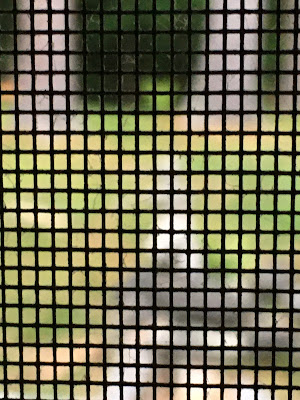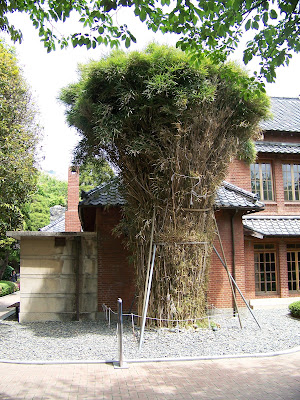I am embarrassed to admit that I have not always understood the first lines of Robert Frost's familiar poem "Mending Wall" to embody a joke of sorts. After all, despite the initial general reference to "something," the poem does provide a number of plausible answers for the question "why walls tend to fall down?" "Something" is not terribly useful in helping us understand what might be behind the "frozen-ground-swell[s]" that are responsible. But perhaps we'll find satisfactory explanation before the poem ends.
"Mending Wall," of course, concerns free-standing stone fences erected years and years ago by New England farmers to clear their fields of rocks. Few things make plowing and planting as difficult as rocky soil. As a teenager during my summer job as farm labor, I spent many hours "picking rocks" out of fields that we had "harvested" rocks from just the summer before. We threw our potato sized rocks into the bucket of a front-end loader before dumping the bucket in piles just off the field.

Today, we think of those walls built before our time as decorative rather than functional, so this poem, which dates from 1914, is instructional as to how farmers might have regarded their stone walls and the work needed to keep them in place. We can all grasp the practical solution of replacing stones that have fallen during the winter.
Other cultures have used walls to achieve particular ends, often as fortification walls. We visited walls along the mountain tops above the Korean port of Busan, built in older times as a bulwark against invaders from the sea. Korea faced frequent attempts to invade their peninsula both from China via the mainland, and from Japan, among others, from the sea. The wall could be manned by soldiers or watchmen, ships could be identified as trading vessels or as foreign invaders before they reached the harbor, and signal fires could be lit to send an alarm quickly from watchtower to watchtower.
Our word "fortification" is often code language for keeping the barbarians at bay. "Barbarian" itself is code for many other undesirable things beginning with "foreign," "alien," "other," "not us." While we don't always take this coded language further, what the words clearly imply are things like murder, rape, pillage, destruction, loss of what is ours. Those "protected" by the wall also see it as a means of securing identity and, perhaps, of controlling the population or regulating trade.

It is easy to think here of some famous walls from antiquity built to serve these functions. Hadrian's Wall, which runs east and west across northern England, is one. Remnants of that wall are a special attraction these days, especially for those interested in Roman ruins. The Romans built great walls. And roadways. And baths. We might have ventured further north to see a part of Hadrian's Wall this last September while visiting in Chester -- had I not gotten sick.
The Great Wall of China, which dwarfs Hadrian's Wall in every way, is another famous "security" wall of ancient construction. We have not seen the Great Wall on our visits to China, but we were able to walk along side of a small scale-model of that wall at an outdoor theme park in Shenzhen called "Splendid China." This miniature was built with meticulous care and precision.
It's not the same experience, of course; but with a little imagination one can get a feel for what the Great Wall entails. The actual Great Wall is visible from space, after all. In addition to the usual reasons regarding barbarians, the Great Wall was also built as a way of hemming in various tribal and ethnic regions to create one "unified" China. The "one China" effort we see today has ancient roots in Chinese history. What struck me in visiting this scale model -- and what has struck me in other places we have visited with architectural and artistic "ruins" -- was the cost of these projects in terms of human lives.
These costs are not part of the PR associated with the tourist experience but one can easily find educated estimates of lives lost during construction. In a quick check regarding number of deaths attributed to building the Great Wall, I kept finding 400,000 popping up in numerous sources, although, of course, it is impossible to get a finely calibrated death toll.
Although they are not walls, many of the famous ancient monuments we saw in Egypt or the fairly recently discovered clay soldier excavations at Xi'an, China, are testament not just to human ingenuity and engineering brilliance, but also to servitude, suffering, and loss of life. It would seem to be a human tendency to look away from human costs in favor of the bright and impressive objects.
The human cost of building, maintaining, and staffing walls with soldiers, watchmen, messengers, trades people and suppliers of all sorts has always proven enormous -- even when the construction itself performs as intended, which, I would argue, is rarely the case. At least they do not appear to perform well for long. "Something there is that doesn't love a wall."
Another trait many of these walls and ruins share with each other is that they were constructed under authoritarian rule. There may be rare exceptions to this generalization, but I don't know of too many. Even the "necessary" wall above Busan was likely built with conscripted labor. The lives of those pressed into labor were not often much different from the day-to-day lives of those who lived within the wall's protection except for the shortened life-expectancy of laborers. This fact in itself would suggest a causal rather than a coincidental link between authoritarianism and the compulsion to build walls.
In recent years, perhaps because we know more about them, barrier walls have a rather more complicated track record. The "wall of separation" put up by Israel in the West Bank to hinder Palestinian suicide attacks seems to have worked for that specific problem; the wall of separation has, in fact, seriously reduced the number of suicide bombers. And we know that Israel operates as a democracy not an autocracy, although the wall has been controversial.
Still, one would be remiss to regard even this wall as a permanent solution because one consequence of the wall is that Jewish Israelis and Palestinian Israelis are no longer able to know each other. The wall sunders daily interactions; it negates community. Citizens on both sides of the wall no longer know each other well. This actualized appeal to separation leads to ignorance, ignorance to suspicion, suspicion to falsehood and fear, fear to grievance, violence, and calls for vengeance.
Think October 7th at the southern border as, perhaps, an unintended consequence.
Other "security" walls built within my lifetime would include the Berlin wall. A particularly notorious part of the "iron curtain," the Berlin Wall was an attempt to keep some Germans out of East Berlin and other Germans in. The Berlin wall was famously opposed by American Presidents of both parties, namely, John Kennedy and Ronald Reagan. This wall, built of cinder block, topped with razor wire, and bordered by kill zones, was simply a hard manifestation of the hard borders we associate with the Soviet Union. Same intentions, same functions, same infliction of lethal punishment on those within and without who dared cross it.
If you are thinking that the iron curtain also has more than a passing resemblance to the much-called-for tall steel border wall along the Rio Grande, you are right. Envisioned by some as "security" for those of us privileged enough to live north of our southern border, it can have a visceral appeal. Thinking that such a wall will protect us, however, is simply wrong. Protection is not that singular nor that simple. The problems that need fixing are much larger and more complex than "great wall" can accommodate.
"Something there is that doesn't love a wall," the poet wrote. I understand the poem, mostly, but I missed the joke. More recently, I got it. The joke. The statement. The alignment. The "frost" pun as personal statement. The joke in those lines is that the "Something" is "frost," as in Frost himself, a force of enlightened thinking and a force of Nature. It's not really funny, but it is telling.
If you are in doubt as to the force of the narrative, you might find it illuminating to read the end of "Mending Wall," noting especially how Frost characterizes the neighbor who keeps insisting that the wall be rebuilt every spring.










